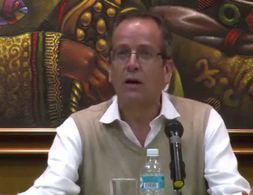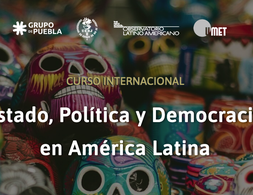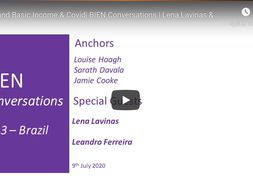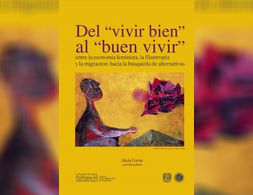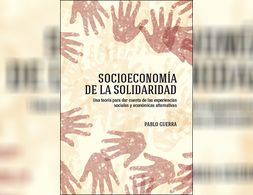✕
19 results
El Área de Derecho realizó el conversatorio “Buen vivir, Sumak kawsay: una oportunidad para imaginar otros mundos”. Participaron: Alberto Acosta, Ariruma Kowii y Santiago Arboleda.
Moderador: Ramiro Ávila Santamaría.
El curso Estado Política y Democracia en América Latina es una iniciativa destinada a militantes y activistas sociales y toda persona interesada en los desafíos de la democracia en América Latina y el Caribe Está organizado por el Grupo de Puebla el Programa Latinoamericano de Extensión y Cultura de la …
As the Covid-19 fueled economic downturn begins to intensify this winter, an extended study of the Italian cooperative sector’s historical resilience in times of crisis can serve as a learning experience for other countries seeking to create policies that foster more stable economies, with job security, care for marginalized communities and adequate counter-cyclical policies. Particularly, the Italian cooperative sector’s contributions to three aspects should be noted in closing. Firstly, the innovative phenomenon of cooperative enterprises has contributed to social inclusion of immigrant communities, the activation of youth, the unemployed and people with disabilities, a true compensation for both a market and state failure. Secondly, they have contributed to a reduction in income and wealth inequalities at a time when the issue of inequality is of global significance. Thirdly, the Italian cooperative movement has helped local communities revitalize in the face of demographic shifts and rendered them more resilient to the ravages of globalization. Each of these in their own right is a remarkable achievement.
Could the Brazilian measures of income support carried out during 2020 be considered one way towards UBI? This questions is broadly addressed in the video.
Exploring Economics, an open-access e-learning platform, giving you the opportunity to discover & study a variety of economic theories, topics, and methods.
Este artículo explora los antecedentes, componentes y sentidos, de los circuitos económicos solidarios (CES) entendidos como propuesta dentro del proyecto de construcción de una economía social y solidaria (ESS). Asimismo, comprendidos sus aspectos más característicos, busca identificar y analizar algunos desafíos para su fortalecimiento y ampliación. Para esto analiza diversos trabajos referidos tanto a la ESS como a los CES.
Introduction Economics is by necessity a multi paradigmatic science Several theoretical structures exist side by side and each theory can never be more than a partial theory Rothschild 1999 Likening scientific work to the self coordinating invisible hand of the market Michael Polanyi cautioned strongly against centralized attempts to steer …
Based on a paper by Jason Hickel and Giorgos Kallis Decoupling refers to the separation of economic value creation material extraction and pollution. Ecological limits pose a challenge to growth-led development and the low historical and predicted rate of decoupling suggests that long-term sustainable growth-led development is impossible.
How should we discuss welfare when understanding the role of growth and the viability of Growth-led development? One option is to look at subjective happiness. This provides an anti-materialistic view which may superficially appear more compatible with significant reductions in consumption in order to remain within safe ecological limits.
Beyond Growth is a collection of educational materials offering a reflection on growth. It was created as a joint project of the associations Fairbindung e. V. and Konzeptwerk Neue Ökonomie, both based in Germany. The page provides learning materials and methods to stimulate thinking about the conditions of our current economy as well as possible alternatives.
This fresh and unique textbook provides students and general readers with an introduction to economics from a new and much needed perspective, characterised by its uniquely pluralist, sustainable, progressive and global approach.
Unlike traditional textbooks, Introducing a New Economics contains the key concepts of pluralism, sustainability and justice. It provides students with the central questions covered by economics including resources, work, employment, poverty, inequality, power, capital, markets, money, debt and value.
Homo sapiens is now evolving into post economy The New Economy must manage scarcity and affluence a dual problem that is not integrated into the main classical economic theories There will be an important shock between opulence described by the economist John Kenneth Galbraith in The Affluent Society and scarcity …
El "vivir bien" y el "buen vivir" son formas de rescatar una nueva aportación del desarrollo, y se presentan justo como una alternativa al pensamiento hegemónico. Ana Esther Ceceña, en el capítulo primero, parte de cómo se organiza lo económico, Alba Carosio, en el capítulo segundo, establece el enfoque de asegurar la calidad de vida de las personas; mientras que Antonio Palazuelos pone énfasis en el Plan Nacional de Desarrollo para el Buen Vivir centrándose en tres factores importantes: la economía popular y solidaria, la seguridad alimentaria y los grupos vulnerables. Silvia Berger evalúa las implicaciones de haber adoptado en el feminismo latinoamericano las líneas generales del movimiento feministas mundial. Por su parte, Jaqueline Butcher explica el tercer sector en México y su relación con el desarrollo económico y social del país. En el capítulo sexto, Rodolfo García Zamora y Monsterrat García muestran cómo las organizaciones de migrantes mexicanos han financiado obras de infraestructura básica en sus comunidades de origen. El libro finaliza con el capítulo siete, a cargo de Ana María Aragonés y Uberto Salgado, quienes se centran en un análisis comparativo del impacto que tienen la migración de trabajadores altamente calificados y las remesas sobre el desarrollo de seis países.
In this book, the author, Intan Suwandi, engages with the question of imperialism through the specific channel of Global Value Chains.
La propuesta de esta obra es que comprendamos cómo la economía y la solidaridad pueden trabajarse conjuntamente. Descubriremos entonces la existencia de comportamientos económicos solidarios e incluso de empresas solidarias que en su conjunto forman parte de un sector de la economía diferente tanto del sector capitalista como del sector estatal.
The book is a collection of 51 texts by different scholars and activists, who each adds a dimension/perspective to the topics of degrowth and societal transformation. A societal transformation towards a degrowth society is dependent on a lot of ideas coming together and creating change from various starting points within a society. Therefore, the authors are quite diverse and their contributions vary from being philosophical, natural science based, economic, sociological and so forth. Some are specfiically focused on a concept and others are a more broad critique of e.g., capitalism or growth.
Pluriverse: A Post-Development Dictionary contains over one hundred essays on transformative initiatives and alternatives to the currently dominant processes of globalized development, including its structural roots in modernity, capitalism, state domination, and masculinist values.
Lean Logic is the late David Fleming’s masterpiece, the product of more than thirty years’ work and a testament to the creative brilliance of one of Britain’s most important intellectuals. A dictionary unlike any other, it leads readers through Fleming’s stimulating exploration of fields as diverse as culture, history, science, art, logic, ethics, myth, economics, and anthropology, being made up of four hundred and four engaging essay-entries covering topics such as Boredom, Community, Debt, Growth, Harmless Lunatics, Land, Lean Thinking, Nanotechnology, Play, Religion, Spirit, Trust, and Utopia. The threads running through every entry are Fleming’s deft and original analysis of how our present market-based economy is destroying the very foundations—ecological, economic, and cultural— on which it depends, and his core focus: a compelling, grounded vision for a cohesive society that might weather the consequences
Surviving the Future is a story drawn from the fertile ground of the late David Fleming's extraordinary 'Lean Logic: A Dictionary for the Future and How to Survive It'. That hardback consists of four hundred and four interlinked dictionary entries, inviting readers to choose their own path through its radical vision. Recognizing that Lean Logic's sheer size and unusual structure can be daunting, Fleming's long-time collaborator Shaun Chamberlin has selected and edited one of these potential narratives to create Surviving the Future. The content, rare insights, and uniquely enjoyable writing style remain Fleming's, but are presented here at a more accessible paperback-length and in conventional read-it-front-to-back format
Necesitamos cookies. Pincha en “Aceptar” para ayudarnos a hacer de Exploring Economics una mejor plataforma.

